
Related
Guests
- Sahar IssaIraqi reporter working with Baghdad Bureau of McClatchy Newspapers.
- Jeremy Scahillaward-winning investigative journalist and author of the bestseller Blackwater: The Rise of the World’s Most Powerful Mercenary Army. His writing and reporting is available at RebelReports.com.
In Iraq, a deadly car bomb in the northern city of Kirkuk has killed up to forty people and injured another 100. Tuesday’s bombing came hours after US troops withdrew from major Iraqi towns and cities, marring celebrations on a day that is now officially declared as “National Sovereignty Day,” a public holiday. We go to Iraq to speak with Sahar Issa, an Iraqi reporter working with the Baghdad Bureau of McClatchy Newspapers. We also speak with investigative journalist Jeremy Scahill about his article, “Iraq’s 'National Sovereignty Day' is US-Style Hallmark Hype.” [includes rush transcript]
Transcript
JUAN GONZALEZ: We turn now to Iraq, where a deadly car bomb in the northern city of Kirkuk has killed up to forty people and injured another 100. Tuesday’s bombing came hours after US troops withdrew from major Iraqi towns and cities, marring celebrations on a day that is now officially declared as “National Sovereignty Day,” a public holiday. Tuesday’s bombing is the latest in a string of recent attacks that have killed over 250 people in the past ten days.
Despite the formal pullback, some troops will remain in Iraqi cities, while the majority of the 130,000 US troops will remain on bases scattered across the country.
The Iraqi Prime Minister Nouri al-Maliki and President Jalal al-Talabani praised the achievements of, quote, “the new efforts to rebuild Iraq based on democracy.” President Obama also praised the pullback and called it a step towards Iraqi sovereignty.
PRESIDENT BARACK OBAMA: It’s a part of our strategy to responsibly end the war by removing all American combat brigades from Iraq by next September and of all of our troops from Iraq by the end of 2011. So the Iraqi people are rightly treating this day as a cause for celebration. This is an important step forward, as a sovereign and united Iraq continues to take control of its own destiny.
Now, make no mistake, there will be difficult days ahead. We know that the violence in Iraq will continue. We see that already in the senseless bombing in Kirkuk earlier today. And there are those who will test Iraq’s security forces and the resolve of the Iraqi people through more sectarian bombings and the murder of innocent civilians. But I’m confident that those forces will fail.
JUAN GONZALEZ: Meanwhile, the top US commander in Iraq, General Ray Odierno, said allowing Iraqis to take charge of their cities is, quote, “psychologically important to them.”
GEN. RAY ODIERNO: Today was an extremely important day for Iraq, and it’s psychologically important to them. It’s psychologically important that they now have made progress with their security forces, that they made progress where they can now take charge inside of the cities. It’s important for us that we understand this and recognize this and allow them to exercise that authority.
AMY GOODMAN: For more on Iraq, we’re joined on the line from Baghdad by McClatchy reporter Sahar Issa, an Iraqi citizen. We’re also joined via Democracy Now! video stream by award-winning investigative journalist Jeremy Scahill, who’s also written extensively about this, author of the bestselling book Blackwater: The Rise of the World’s Most Powerful Mercenary Army, writing extensively about the National Sovereignty Day at his blog rebelreports.com.
Sahar, let’s begin with you. Tell us what’s happened in Iraq, both National Sovereignty Day, the response of Iraqis, and the bombings that have taken place, as well.
SAHAR ISSA: National Sovereignty Day, of course, is a day that is celebrated by the hearts of all Iraqis. You must know that Iraq is a pride — is a proud country, and Iraqis are proud people. It is difficult for them not to be happy at the action of foreign troops leaving their cities and their streets.
At the same time that they are happy to gain control over their streets and cities, there is a doubt in their hearts whether the Iraqi security forces are actually adequate to the task that is in front of them in the coming days, weeks and months of keeping the peace and keeping the population secure. This is at the bottom of the doubt that you see, is — is the Iraqi force actually adequate to the task? — that the Iraqi force is infiltrated by many. The Iraqi force has been formed upon somewhat sectarian lines. The Iraqi force also, because of the administrative corruption, has many people who have brought in their relatives, their friends, their neighbors, people who are not professional. And after six years, perhaps it would be a legitimate question to ask and to forward to the American forces: after six years of training they have undertaken to present Iraq with a new force after dismantling the old one, why isn’t the Iraqi force actually adequate to the task? The people of Iraq ask this question. It is the first question they ask. They are still not confident that the Iraqi forces are capable.
And, of course, unfortunately, giving proof of this is that the terrorists or the insurgents, or whatever we want to call the crooks that are actually taking out the innocents, are capable of hitting when they want and where they want, in spite of checkpoints, in spite of explosives detectors, in spite of, to tell you the truth, the cooperation even of the people with the forces. Nevertheless, the violent attacks are taking place. In Kirkuk it took place. In Sadr City it took place only one day after the American forces left it. It was said by a sample of the prominent politicians to us that this is a message to people in Sadr City: do not be happy that the US forces are leaving. And so, underlying the happiness of Iraqis to see foreign troops go out of their cities, go out from their thoroughfares, there is a fear that perhaps the Iraqi security forces are not adequate to the task.
JUAN GONZALEZ: And, Sahar Issa, what about the ability of the Iraqi government to provide basic services to the population? There’s obviously many reports of corruption within the government and continued infighting among the various factions. How has the public seen the ability of the government to administer the society?
SAHAR ISSA: To tell you the truth, if you look back a little bit, you will find that with the height of violence that only started coming down in the beginning of 2008, and while human life was at stake, violence was like a blanket, cutting off a cross-section of what is really happening inside the Iraqi government, because everything was so clouded, people were hurt, they couldn’t look further than their lot.
But when the violence ebbed after the beginning of 2008, people started picking up the reins of their lives, looking around to see what was going on. And they found, horrendously, that the government is totally riddled with corruption. It is totally built on tribal and sectarian bases, where people have their relatives in very sensitive places simply to make the profit. And the confidence in Iraqis that they had at first when they went to elect their government, they lost this confidence. They said, “Then what is the difference, if it is going to be tribal again? What is the difference between this government and the past, even if it is elected, if it is going to use the same lines?”
And that is, of course, part of the problem, is that it is not a matter of just putting the government out there. The problem is this government needs to gain the confidence of the people. It needs to give them something that they can hold onto. It needs to look at their very difficult lives. They didn’t have electricity when the — you know, outside this building, if I walk out now, it is so hot, toys will melt in cars. To just to give you an idea, toys will melt in cars. That is the heat. And people don’t have electricity. After six years, they don’t have water in their homes.
I spoke to a person yesterday in Beya’a neighborhood, when we were touring the city for reactions. And she said, “How can I be happy with sovereignty, if sovereignty has not brought me enough water to bathe, I can’t wash my clothes, if I don’t have electricity so I can sleep at night? What kind of sovereignty is this?”
We are struggling, my dear friend. We are struggling so hard to reach square one. And so far, we haven’t achieved it yet.
AMY GOODMAN: Sahar Issa, are you afraid of having your image known, of being identified as a reporter?
SAHAR ISSA: Oh, certainly, certainly, certainly. Working for a foreign — never mind a US, American — news agency will have me very clearly titled as the pastor’s pie or working for the occupation. People — the simpler people, let us say — can’t differentiate between a person who is picking up information and lighting things and making things public for — to, how do you say, to extend a hand to other people to know what is actually going on inside our country. They can’t tell the difference between this person and the person who’s gathering information perhaps for intelligence preferences. And therefore, yes, of course, I am afraid. No one knows. Only my parents and my children and the people working with me know. And even the people who are working with me, not all of them know where I live. That’s how bad it is.
JUAN GONZALEZ: We’re also joined by Jeremy Scahill, award-winning investigative journalist and author of the bestseller Blackwater: The Rise of the World’s Most Powerful Mercenary Army. Jeremy, welcome to Democracy Now!
JEREMY SCAHILL: Thanks, Juan.
JUAN GONZALEZ: Your reaction now to this National Sovereignty Day, and especially also if you could talk about the recent awarding of some oil contracts in Iraq?
JEREMY SCAHILL: Right. I mean, this is a very contrived sort of Hallmark holiday here. I doubt that decades from now many Iraqis are going to be, you know, telling their grandchildren where they were on National Sovereignty Day. I mean, remember the whole stumbling of President Bush: when he declared Iraqi sovereignty, he talked about the definition of sovereignty as a sovereign entity. Paul Bremer already officially handed over sovereignty to the Iraqis five years ago, and yet we have 130,000 US troops that remain in the country. This really is George Bush’s Iraq plan that Barack Obama is now implementing and taking the political risk of implementing, because if the violence blows up, then of course it looks very much like Barack Obama has been a failure in Iraq, and not George Bush. So Obama, in many ways, has played into the Bush administration’s hand.
But we can see the clearest endgame of the US occupation in the fact that the Iraqi government, on a day when they declare their own sovereignty and you have the US military commander handing over the keys to the Defense Ministry, the Iraqi Oil Ministry opens up the country for bidding now on its oil resources, and you had eight of the ten top oil companies in the world that are not part of a nationalized state apparatus. In other words, eight of the ten most powerful private oil corporations in the world are now bidding for large shares of the Iraqi oil supply. I mean, to me, this is a grotesque symbol of what exactly is happening in Iraq.
And let me just say, Juan, that while we’re seeing the sort of contrived celebrations, where ordinary Iraqis, for the most part, are not permitted to go into these big celebrations — it’s largely off-duty police officers, Iraqi soldiers and dignitaries — the reality is that US soldiers are simply going to the outskirts of the cities and could easily go in to strike at them. General Ray Odierno, the top US military commander there, would not be clear on how many US soldiers are going to remain in the region. At the end of the day, the US has a massive eighty-football-field-size embassy. They have thousands upon thousands of contractors, 130,000 troops still in the country. And they’re going to keep a force of 35,000 to 50,000 residual US forces when Obama is officially done withdrawing from Iraq.
So, in reality, we see Barack Obama implementing, almost to the letter, George Bush’s and the neocons’ plan for Iraq, while putting a Democratic stamp on it and essentially downsizing and rebranding what remains a US occupation. So, no, this is Hallmark holiday stuff. And I think it’s clear for anyone who’s been following this that this is the same situation as when Bush tried to declare Iraqi sovereignty, when Paul Bremer snuck out of Baghdad in June of 2004.
AMY GOODMAN: Sahar Issa, one last question, and we only have ten seconds. Do people in Iraq view the United States differently under President Obama?
SAHAR ISSA: I beg your pardon? Come again?
AMY GOODMAN: Do people view the United States differently under President Obama than Bush?
SAHAR ISSA: They do not view it differently. They just hope it will be a different nation, perhaps, as he is a change, in himself, in his own nation.
AMY GOODMAN: We will leave it there. Sahar Issa, Iraqi reporter working with the Baghdad Bureau of McClatchy Newspapers, and Jeremy Scahill, who is reporting on this at rebelreports.com, author of Blackwater: The Rise of the World’s Most Powerful Mercenary Army.
Update on the situation of the Free Gaza ship, of the number of people who have been arrested, it looks like two people have been released of about nineteen people. Among those who have been detained by the Israeli government are former Congress member Cynthia McKinney.

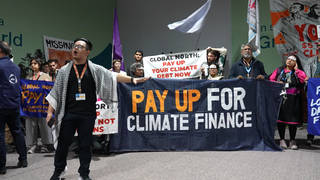
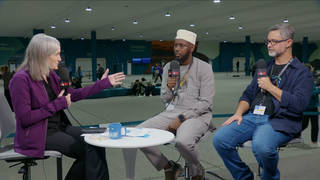
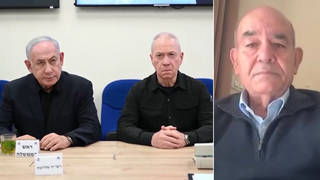
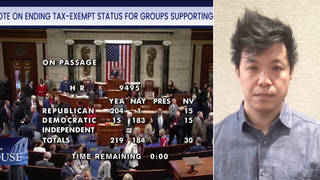





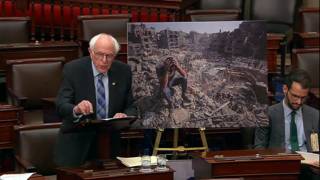

Media Options